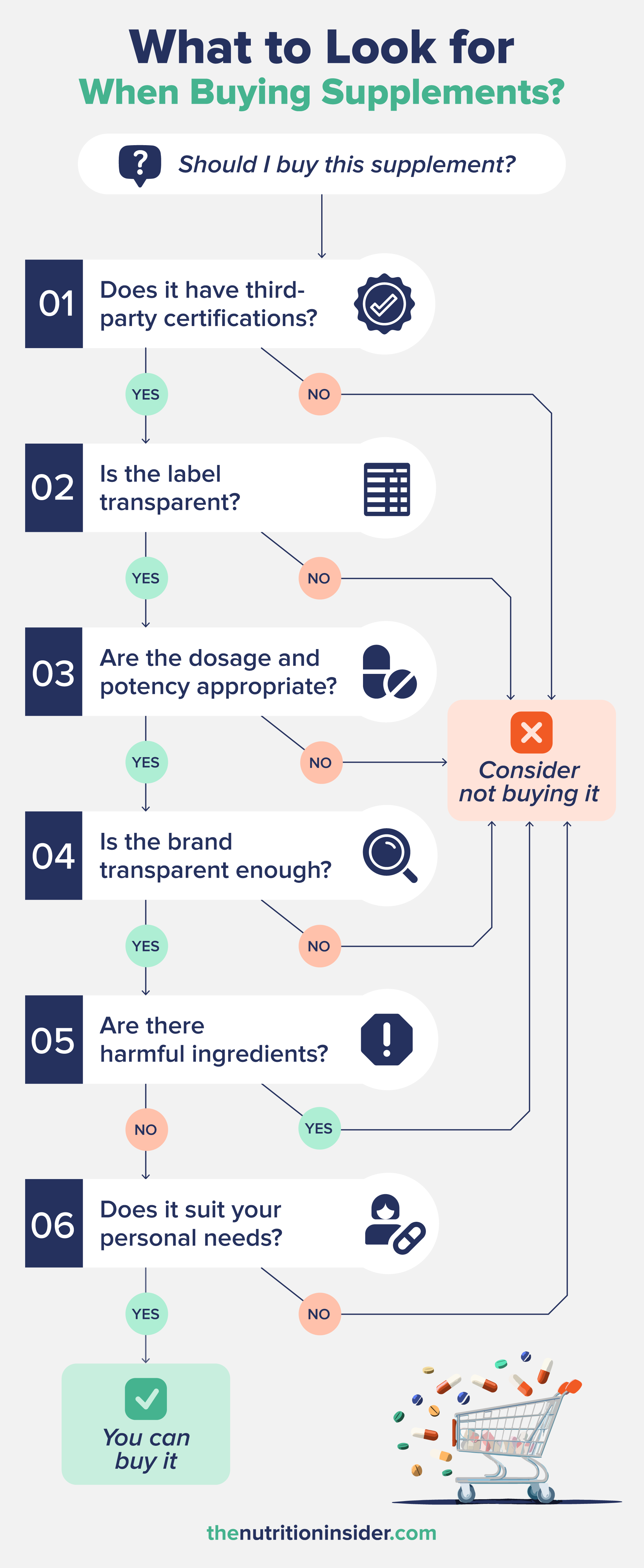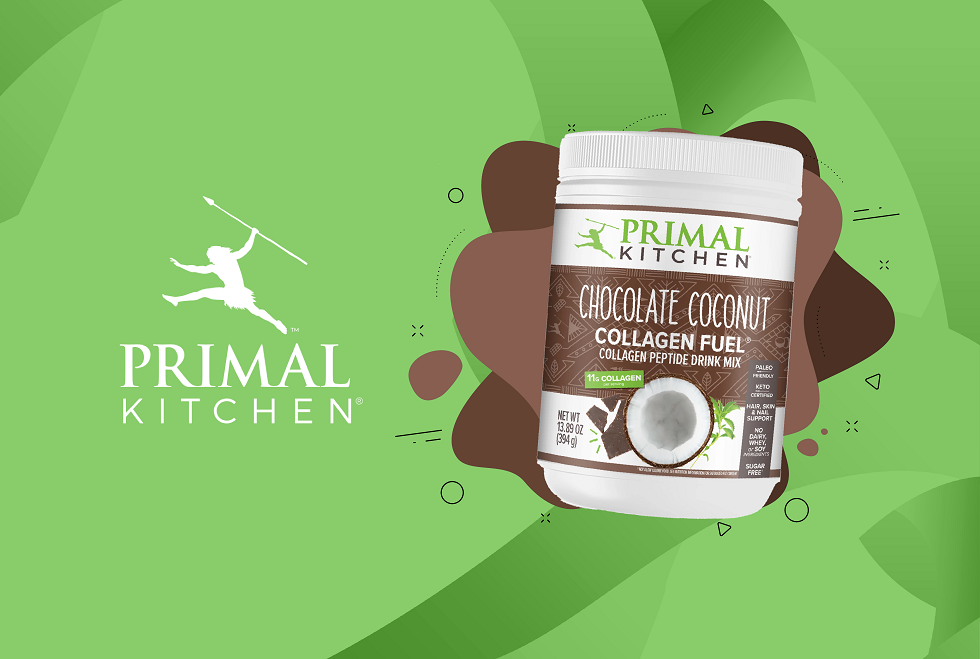This post contains links through which we may earn a small commission should you make a purchase from a brand. This in no way affects our ability to objectively critique the products and brands we review.
What to Look for When Buying Supplements
Evidence Based Research To fulfill our commitment to bringing our audience accurate and insightful content, our expert writers and medical reviewers rely on carefully curated research.
Read Our Editorial Policy
If you stroll down the supplement aisle in your pharmacy or local health food store, the vast array of pills, powders, tablets, and gummies is bound to bring up some questions—primarily, which ones are actually high-quality, and how do I tell the difference?
Add in the plethora of supplements found online, from Amazon to TikTok Shop, and the confusion can only multiply.
If you’re one of the three-quarters of Americans who consume dietary supplements from a loosely regulated industry worth billions of dollars, you need to know what to look for when buying supplements.
Supplement Regulation 101
Unfortunately, dietary supplements—which can include vitamins, minerals, antioxidants, botanical extracts, probiotics, protein powders, and so much more—are not a well-regulated industry.
Unlike pharmaceuticals and food, dietary supplements do not require FDA (U.S. Food and Drug Administration) approval before being brought to market.
The manufacturers themselves are wholly responsible for ensuring their supplements are safe and accurate—and, as you can imagine, not all supplement manufacturers have the consumers’ best interests at heart.
As scary as it sounds, anybody can put a supplement up on the shelves for you to buy—and the FDA probably won’t even take notice of it unless a problem arises and it ends up on their radar.
After a supplement is on the market, the FDA monitors safety through voluntary adverse event reporting from consumers, healthcare providers, and manufacturers. This means that many people have to report something wrong before action is taken.
The FDA can take action—starting with warning letters, then fines, then recalling products—if a supplement is found to be unsafe, mislabeled, or if false claims are made.
At some point––though it is not checked before it is sold on the market—dietary supplements have to receive a Good Manufacturing Practices (GMP) certification.
The FDA requires supplement manufacturers to follow Good Manufacturing Practices (GMPs) to ensure the identity, purity, strength, and composition of their products. This includes proper labeling, avoiding contaminants, and ensuring that the supplements contain what the label states.
Another area that the FDA regulates is supplement labels, including mandating that the product has a Supplement Facts panel with active ingredients, serving size, amount per serving, and any other ingredients used.
The FDA also has strict rules on health claims and only approves a select few to put on a supplement label based on robust research proving the link.
For example, a calcium supplement can say, “Adequate calcium throughout life, as part of a well-balanced diet, may reduce the risk of osteoporosis.” However, unsubstantiated and unapproved health claims like “Berberine reduces the risk of type 2 diabetes” are not allowed without receiving FDA approval.
The FDA mandates that supplement labels include a Supplement Facts panel that lists the active ingredients, serving size, amount per serving, and any other ingredients used, like fillers, binders, and flavorings. Health claims on labels must be substantiated, and specific claims (like “reduces the risk of heart disease”) require FDA approval.
However, the FDA only investigates products once they are on the market, which is why third-party testing and certifications are so important to look for.

What to Look for When Buying Supplements
Third-party testing on supplements is not required by the FDA (or any law). So, manufacturers that voluntarily choose to undergo this testing can show proof of a high-quality product.
Third-party certifications can help clear up any concerns or questions consumers may have about the following:
- Identity. This ensures the product contains exactly what it claims and is accurately labeled, including being standardized from batch to batch.
- Strength. Verifies how potent the product is, ensuring the product contains the correct amount of each ingredient and is accurately labeled so the consumer takes the right amount.
- Purity. Verifies how “pure” the contents are and that they do not contain harmful chemicals, heavy metals, or ingredients not approved for those competing professionally.
Since the FDA requires it, the most common third-party certification is GMP, which can be acquired from multiple certifying bodies, though most commonly through the NSF (National Sanitation Foundation).
A supplement company can also get its products certified with the USP (U.S. Pharmacopeia), guaranteeing accurate identification, purity, potency, and performance.
Other objective third-party indicators of quality are supplements that have a Certificate of Analysis (COA), which details identity, purity, and strength. Independent companies like NSF, USP, Banned Substances Control Group (BSCG), or ConsumerLab can provide COAs.
Dietary supplement companies can also get certifications for being USDA Organic, Non-GMO Project Verified, certified gluten-free, and certified vegan, which are not necessary but are considered “above and beyond.”
Label Transparency
According to the FDA, all dietary supplements need to have the following on their Supplement Facts labels:
- Active ingredients and amounts
- Serving size
- Amount per serving
- All other ingredients used, including fillers and binders
- Allergens
- Net quantity of contents
- Directions for use
- Manufacturer, packer, or distributor
If the supplement does not show all of that information, we wouldn’t recommend taking it.
Quality supplements should also not make exaggerated health claims. Be very wary of any supplement saying something like “rapid weight loss guaranteed,” “cures cancer,” or “belly fat banished!”. These statements are not allowed by the FDA, meaning the manufacturer may also be skirting laws or regulations with Good Manufacturing Practices or labeling.
Dosage and Potency
The concentration (aka “dosage”) of a supplement is also an important consideration when choosing the best products—after all, you don’t want to take something that ends up not being effective in any way.
When looking at a supplement, we answer questions like:
- Is that dosage at or above the Recommended Dietary Allowance (RDA)?
- Is this dosage close to or exceeding the Tolerable Upper Intake Level (UL) for these substances?
- Is this a safe dosage?
- Is this dosage similar to dosages used in clinical studies?
The answers to these questions help us determine how safe or effective a supplement might be.
Brand Transparency
When conducting our selection process, it’s not enough to just look at a bottle or product page online and make an assessment of that supplement.
This is what we call “transparency.”
The harder it is to find information, the less transparent we consider that company, which throws up a red flag for us as reviewers.
When a company makes it easy to find that information, they generally have all their ducks in a row, making them a more trustworthy option than others on the market.
If brands are upfront about where they source ingredients from, how they make their products, what environmental or sustainability measures they have in place, and any philanthropic efforts they contribute to, that elevates their brand transparency.
Ingredients
Supplements don’t solely contain the vitamins or nutrients on the label—they also include ingredients for the capsule, anti-caking or flow agents, and filler compounds to stabilize or bind everything together without gumming up.
While a laundry list of “other ingredients” on a supplement label may raise red flags, these compounds aren’t always bad—in fact, some of them are even beneficial to help you digest the compounds or can improve taste and aroma.
That said, there are also many potentially harmful ingredients found in common supplements that we do not want to see, including:
- Titanium dioxide
- Artificial colors or flavors
- Hydrogenated oils
- Artificial preservatives
- Artificial sweeteners
- High fructose corn syrup
- Shellac
Personal Needs and Preferences
Lastly, you may need to look for certain things based on your personal preferences or needs.
First off, everyone should speak with their healthcare provider before starting new supplements, especially if you have chronic health conditions or take prescription medications.
Even the most innocuous-sounding supplements can interact negatively with medications, so it’s essential to ask your doctor if supplement X is okay to take with medication Y.
Some supplements also interfere with the accuracy of lab results (like biotin), so your doctor will need to know that if you’re getting lab work done.
Another concern is taking too many supplements with overlapping ingredients, which could mean you are taking excessive or toxic doses of a vitamin, mineral, herb, or other compound.
You’ll also need to look for allergen warnings if that is a concern to you, and know that not all supplements are vegan or vegetarian. Gelatin and fish oil are two of the most common non-vegan ingredients found in supplements.
Lastly, consider the form of the supplement you prefer, such as pills, capsules, powders, gummies, or liquids.
High-Quality Supplements FAQs
How do you find trusted supplements?
The best and easiest step is to look for third-party certifications like NSF, NSF Certified for Sport, or USP. This means the supplement has been verified for purity, potency, strength, and contaminants. If a supplement has a Certificate of Analysis (COA) for each product, that is also a good sign. Check out our Trusted Brands section for trusted supplements that we’ve vetted for you.
What is the most important thing when choosing a supplement?
Third-party certifications like NSF, NSF Certified for Sport, or USP are the most important things to look for in high-quality supplements.
Which form of supplement is best?
This depends on so many factors, primarily what supplement it is. Different vitamins, minerals, and compounds have different bioavailability in various forms, so there is no one-size-fits-all answer here. In general, liquid supplements are absorbed more rapidly and efficiently.
What are the most important supplements?
The most important supplements vary widely from person to person. In general, many people could benefit from vitamin D, magnesium, probiotics, and fish oil or omega-3s. However, not everyone needs all of these, and others may require different supplements based on their health status.








